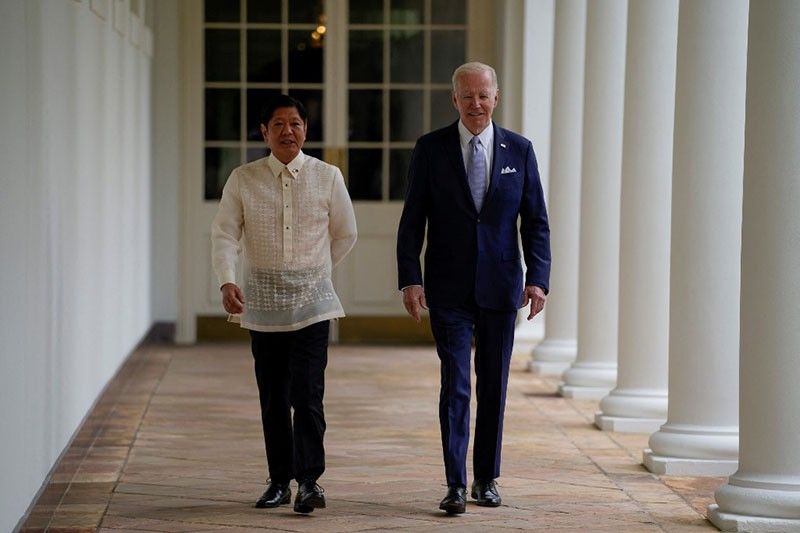Power in partnership: The strategic significance of the US-Philippines alliance

Following the successful conclusion of this year's Balikatan exercise and the announcement of four new sites under the Enhanced Defense Cooperation Agreement (EDCA), the Philippines has taken another strategic step to redefine its longstanding alliance with the United States.
President Ferdinand Marcos Jr. recently arrived in Washington, D.C., for a five-day official visit to discuss ways to reinforce and modernize the enduring partnership between the two countries. His visit to the White House, considered the first for a Filipino leader in more than ten years, marks a clear departure from the foreign policy pursued by the previous administration.
In his bilateral meeting with US President Joe Biden, President Marcos Jr. said that it is only “natural” for the Philippines to forge closer ties with the United States considering that it is the country's sole treaty ally in the region. Recognizing the strategic significance of the alliance in maintaining peace and stability, President Biden reaffirmed the “ironclad” commitment of the United States to protect the Philippines in the event of an armed attack on its armed forces, public vessels, or aircraft, including those stationed in the South China Sea. He also mentioned his plans to continue supporting the modernization goals of the Armed Forces of the Philippines (AFP).
Last year, the United States announced its plan to provide $100 million in military assistance to the AFP in an effort to boost the country’s defense capabilities. During the recent 2+2 ministerial dialogue between Manila and Washington, it also earmarked an additional $18 million on top of the initial $82 million to support the development and operationalization of EDCA sites.
As tensions in the region continue to rise, the Philippine government has forged closer ties with the United States and other strategic partners to build deterrence and strengthen the country’s capacity to address potential conflicts, particularly in the maritime domain.
In a joint statement, President Marcos Jr. and President Biden reaffirmed their commitment to freedom of navigation and overflight in the South China Sea. They have also stressed the crucial need to respect the sovereign rights of states within their exclusive economic zones (EEZ) in accordance with international law.
The Philippine Coast Guard (PCG) recently confirmed reports of a near-collision around the Ayungin Shoal after a Chinese Coast Guard (CCG) vessel kept a close distance from one of its patrol vessels, BRP Malapascua. In the same vicinity, the PCG also reported that a CCG vessel persistently monitored and trailed BRP Malabrigo at a close distance of 700 yards.
Despite the fact that the Philippine government has repeatedly maintained that the Ayungin Shoal is within the country's exclusive economic zone (EEZ), China claims that the PCG vessels intruded on its territory without permission and that the CCG was simply taking precautionary measures to avoid conflict.
Although President Marcos Jr. said that China has agreed to discuss recurring issues in the West Philippine Sea, it has continued to harass Philippine vessels and disrupt the livelihood of Filipino fishermen, forcing the Philippine government to strategize and seek ways to effectively manage its aggressive behavior in the region.
As part of these efforts, the Philippines and the United States recently issued new Bilateral Defense Guidelines, which serve as a framework for strengthening defense cooperation and increasing interoperability between the two countries across multiple domains such as land, sea, air, space, and cyberspace. The new guidelines also aim to identify priority areas of defense cooperation and foster a common understanding of the roles and missions of both countries. It also outlines initiatives to enhance bilateral planning and information-sharing between the Philippines and the United States.
In his meeting with President Marcos Jr., US Secretary of Defense Lloyd Austin III discussed his plans to help accelerate the defense modernization efforts of the Philippines as well as concrete steps to expand operational cooperation in the maritime domain.
Echoing the statement of President Biden, he also reiterated the commitment of the United States to defend the country under the MDT. Secretary Austin visited the Philippines last February and met with President Marcos Jr. together with top defense and foreign affairs officials from Washington.
The US-Philippines alliance is expected to remain a key strategic partnership for both countries in the coming years. However, it will most likely face ongoing political challenges and must adapt to evolving security and economic developments in the region. In a recent forum organized by the Stratbase ADR Institute, this was highlighted by Professor Victor Andres “Dindo” Manhit.
He argued that maintaining a rules-based order in the region requires fostering close cooperation with like-minded partners such as the United States, Japan, and Australia. General Emmanuel Bautista, former Chief of Staff of the AFP, and Mr. Brett Blackshaw, current political counsellor of the US Embassy in the Philippines, both emphasized the strategic importance of the US-Philippines alliance in upholding and defending the country's sovereign rights, particularly in the West Philippine Sea.
By deepening and diversifying the country’s alliance and strategic partnerships, the Philippines under the leadership of President Marcos Jr. can strategically navigate the increasing complex region and eventually contribute to the shared vision of a Free and Open Indo-Pacific.
Jikko Alfonso Puzon is a research manager at think tank Stratbase ADR Institute.
- Latest
























